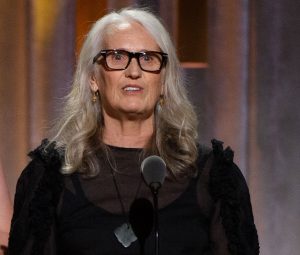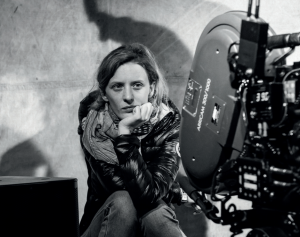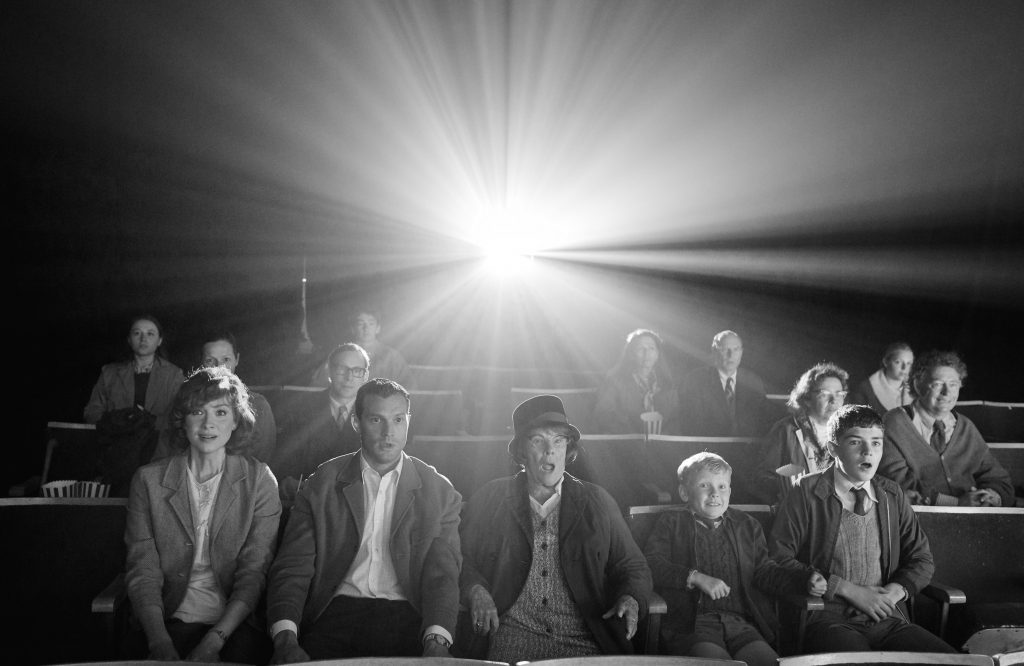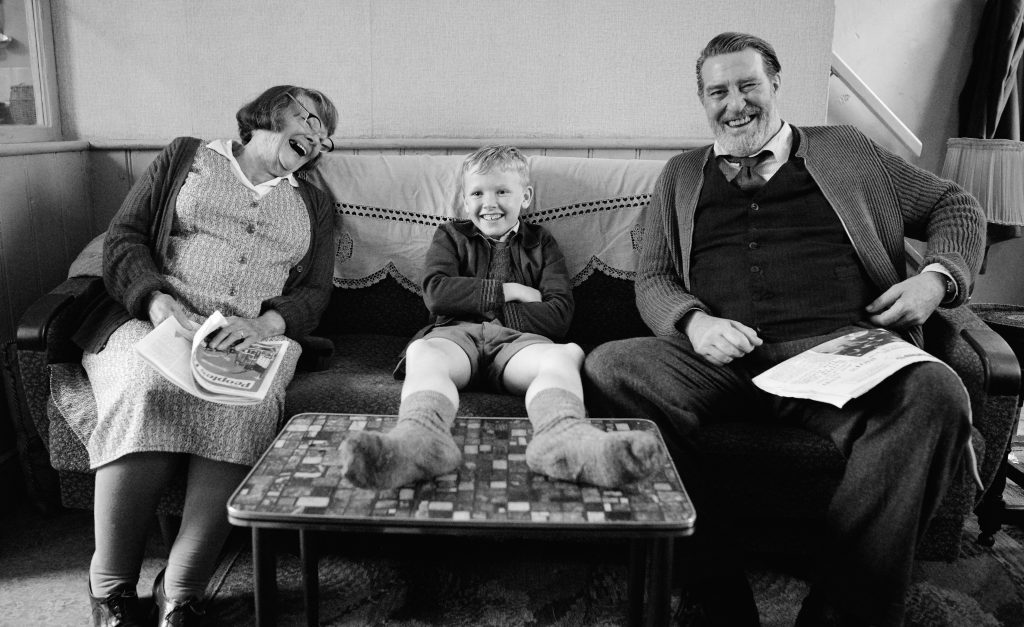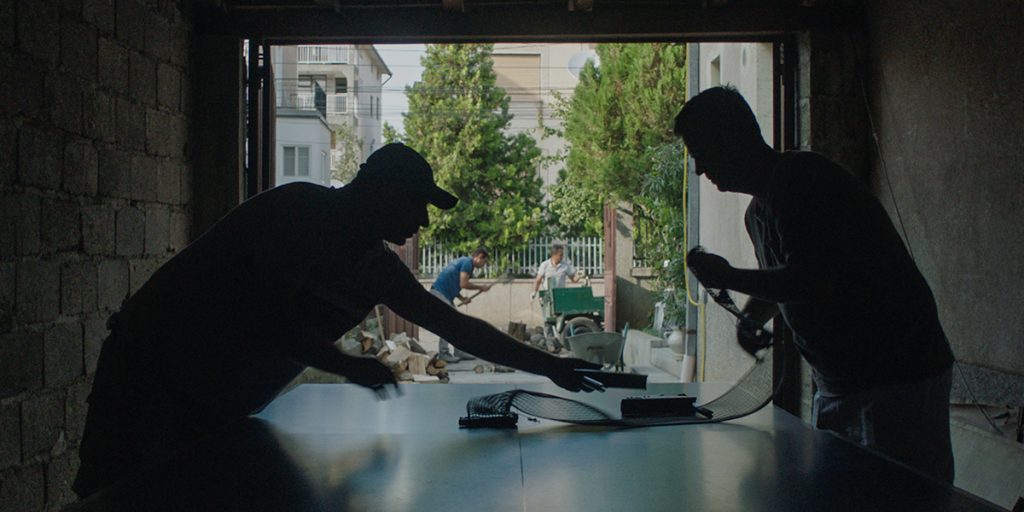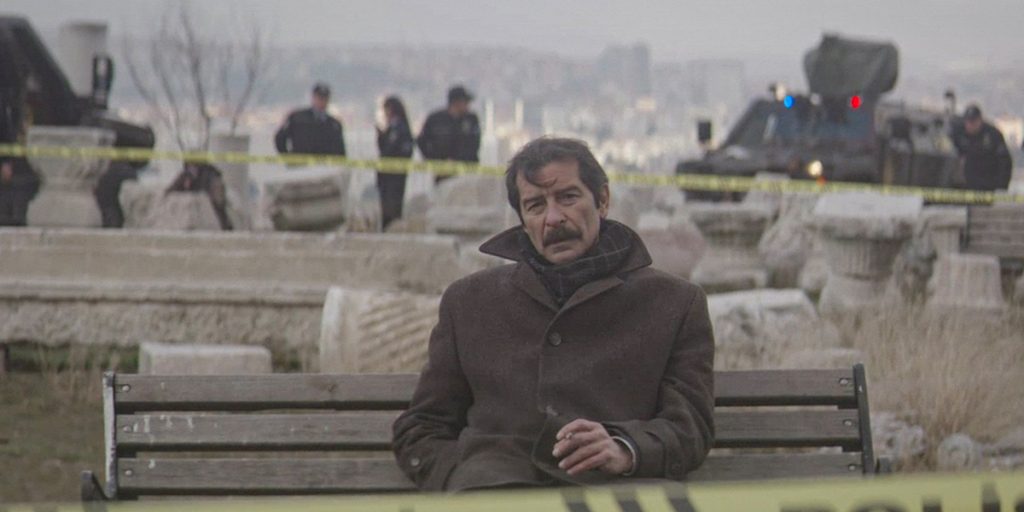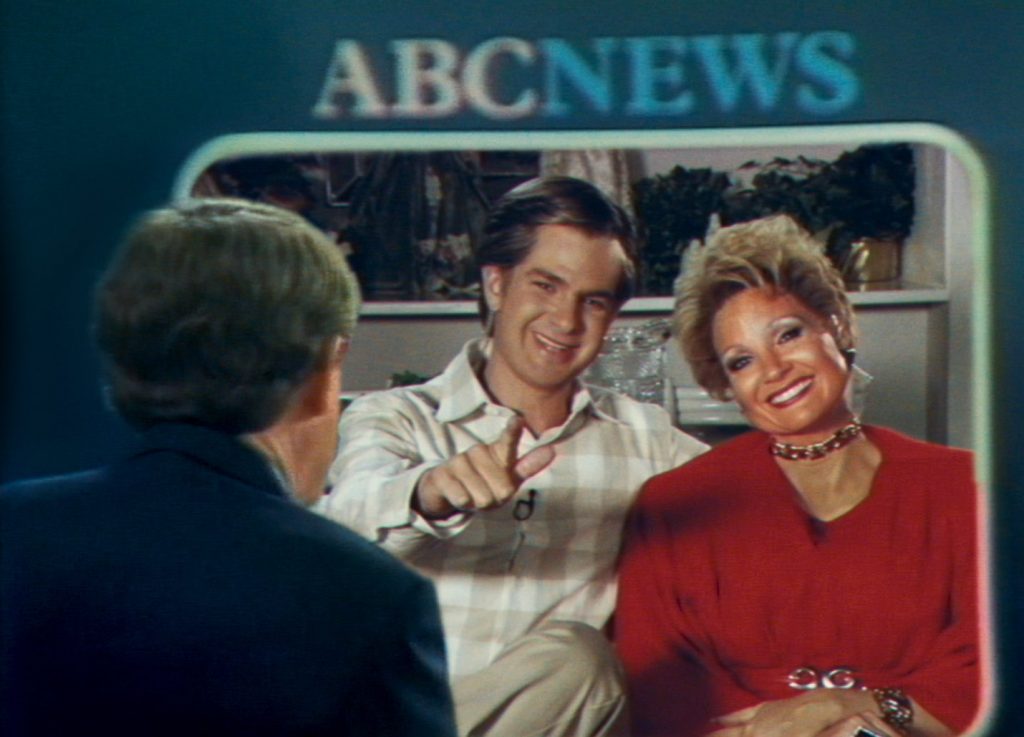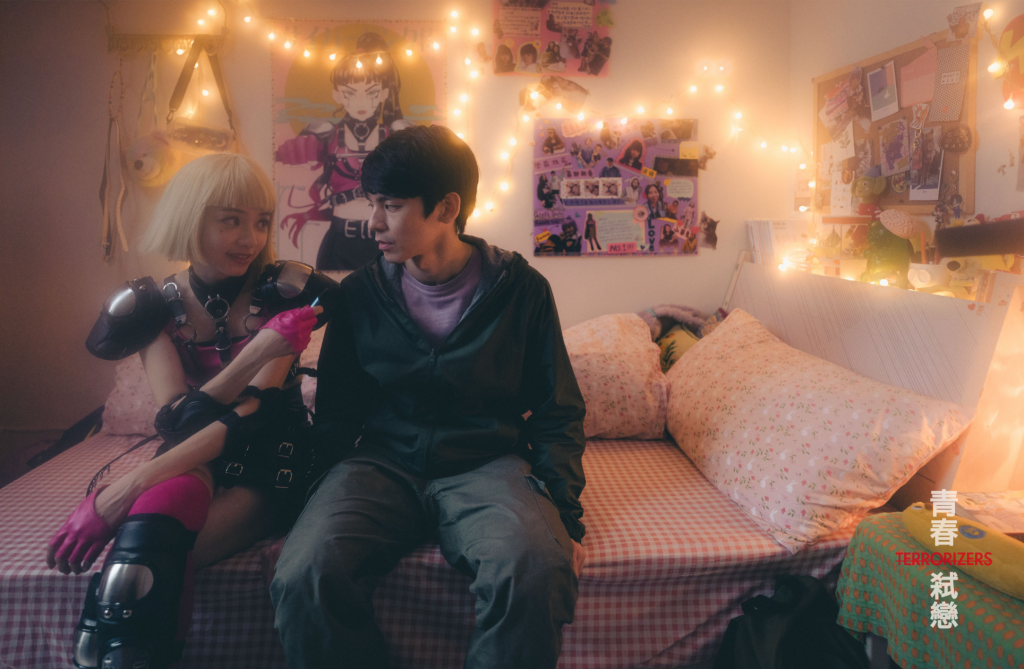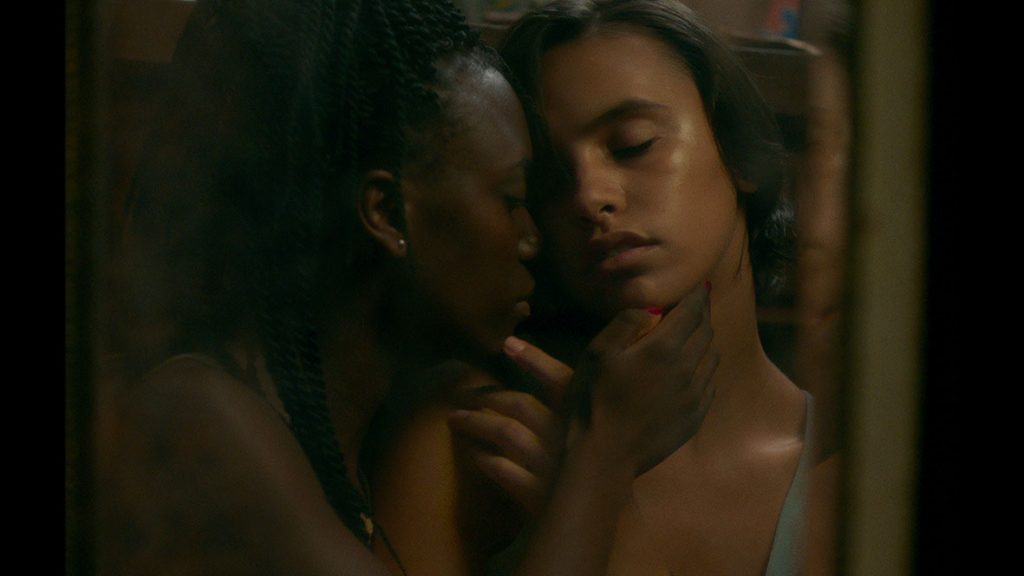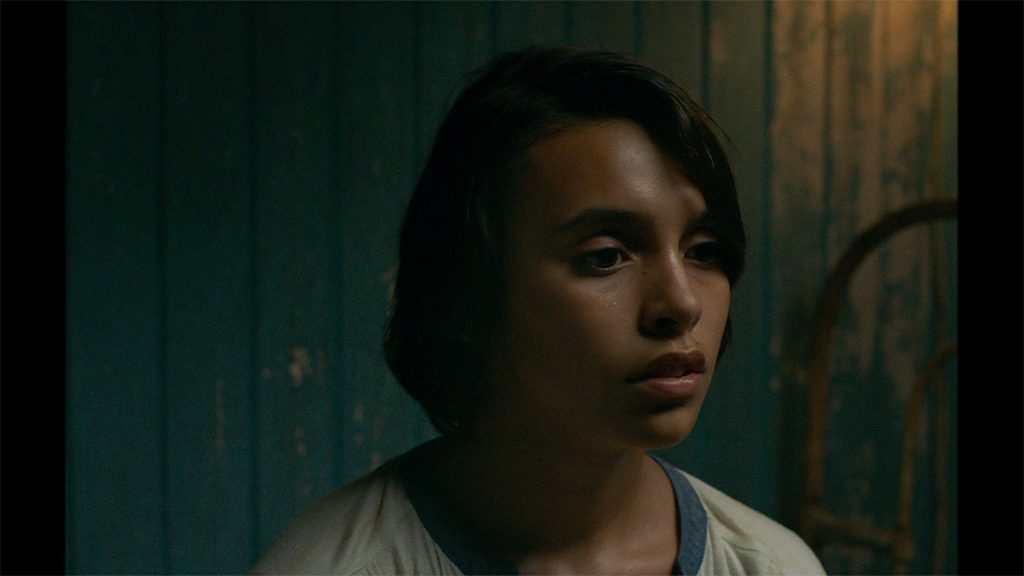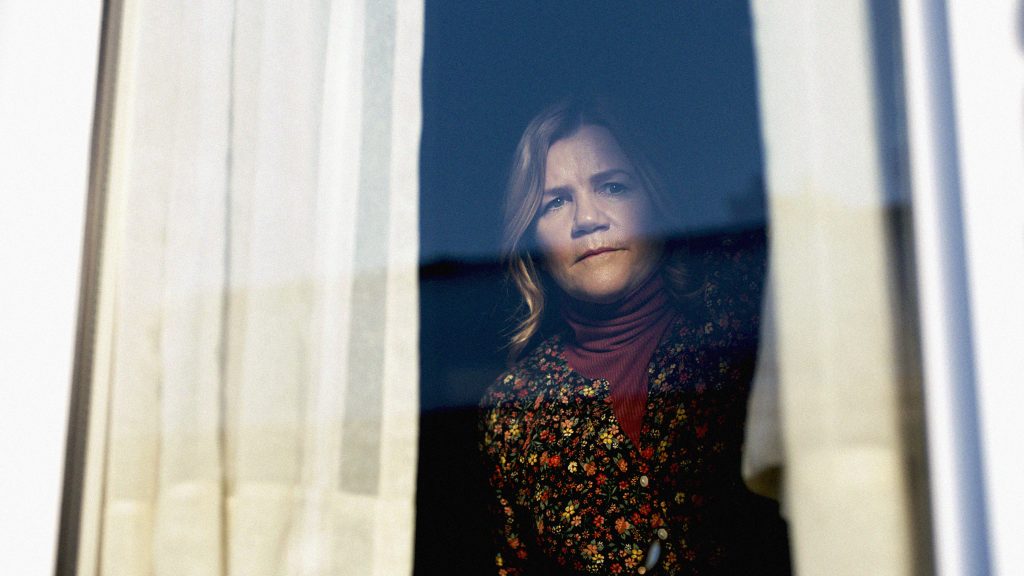September 23, 2021
by Carla Hay
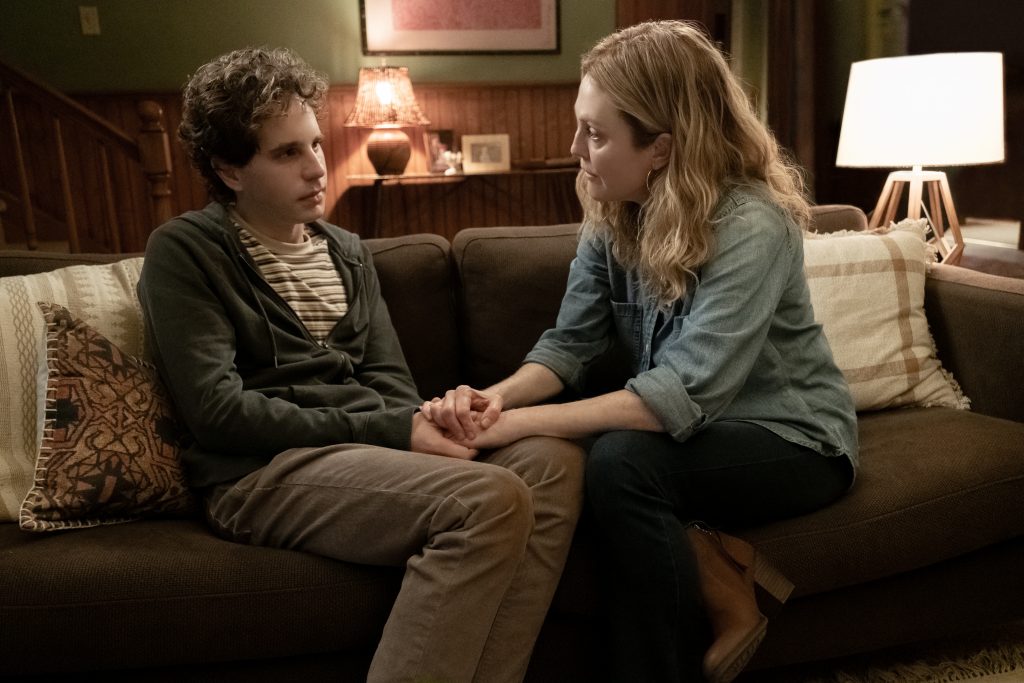
Directed by Stephen Chbosky
Culture Representation: Taking place in Bethesda, Maryland, the musical film “Dear Evan Hansen” features a cast of predominantly white characters (with some African Americans and Asians) representing the middle-class.
Culture Clash: Due to a misunderstanding over a typed letter, a lonely teenager in his last year of high school pretends that he was the secret best friend of a fellow student who committed suicide.
Culture Audience: “Dear Evan Hansen” will appeal primarily to people who are fans of the Tony-winning musical on which this movie is based, but the movie fails to capture the spirit of the stage version.
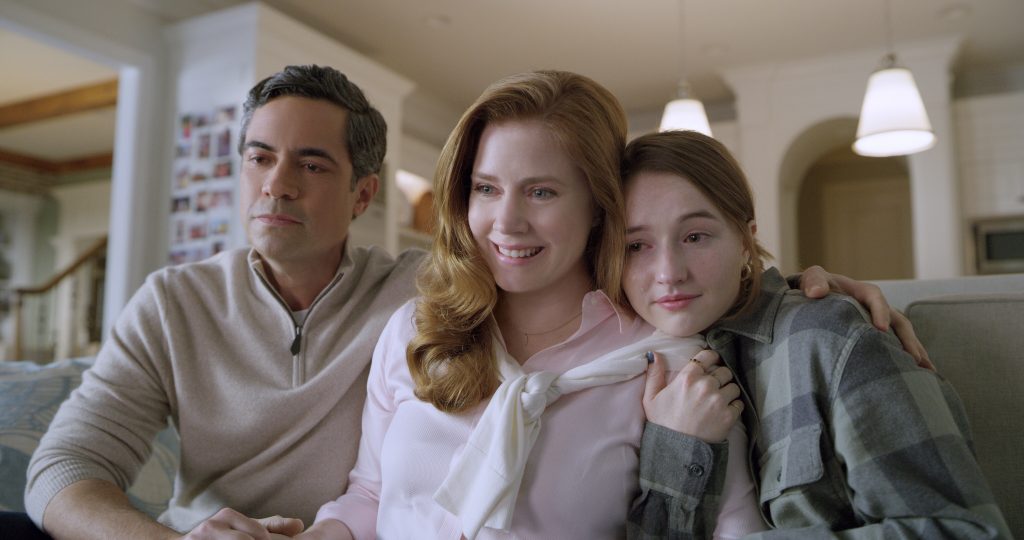
On paper, the movie musical “Dear Evan Hansen” seems like it would be guaranteed to have the same appeal as the Tony-winning musical on which it’s based. However, the movie’s talented cast can’t redeem this misguided mush that clumsily handles serious issues such as mental illness and suicide. Sometimes, it isn’t enough to have members of a Broadway musical’s Tony-winning team reprise the same roles for the movie. The “Dear Evan Hansen” movie had its world premiere at the 2021 Toronto International Film Festival.
Several of the principal team members who won Tony Awards for the “Dear Evan Hansen” stage musical came on board for the movie version of “Dear Evan Hansen.” Ben Platt returns in his starring role as Evan Hansen. Steven Levenson wrote the musical’s book and the movie’s screenplay. Marc Platt (Ben Platt’s father) is a producer. Benj Pasek and Justin Paul wrote the musical score and songs. The movie version has most of the same songs from the stage musical, except for the original songs “A Little Closer” and “The Anonymous Ones,” which were both written for the movie.
Stephen Chbosky, who earned rave reviews for writing and directing his 2012 movie adaptation of his novel “The Perks of Being a Wallflower,” misses the mark in directing “Dear Evan Hansen,” another story about a teenage boy who’s struggling with mental illness. (Chobsky was not involved in the “Dear Evan Hansen” stage musical, whose original Broadway production was directed by Michael Greif.) In “Dear Evan Hansen,” Evan Hansen is a socially awkward loner, who is in therapy for anxiety and depression. In the “Dear Evan Hansen” movie, these issues are treated like “disease of the week” plot points. The movie also callously fails, until the last few scenes, to have much regard for the inner life of the person who committed suicide in the story, because the movie is all about Evan Hansen’s angst over keeping secrets about lies that Evan Hansen created.
Unfortunately, the movie missed some opportunities to have more exploration and sensitivity about what led to the suicide that becomes the catalyst for the entire story. Instead, the emphasis is on trying to make viewers feel sorry for a teenager who lies to people about being the suicide victim’s best friend. The movie doesn’t make him an anti-hero but someone who should be admired for coping with his mental health issues while under the stress of concocting elaborate lies.
In the beginning of “Dear Evan Hansen” (which takes place in Bethesda, Maryland), Evan is shown doing a therapy exercise required by his psychiatrist Dr. Sherman: writing a diary-like letter to himself. It’s an assignment that Evan has to do on a regular basis in order to ease some of his anxiety and hopefully boost his confidence. Dr. Sherman is never seen or heard in the movie, which is one of the reasons why parts of this movie look very phony and off-kilter. The self-addressed letter writing becomes the reason why Evan becomes entangled in a misunderstanding and a complicated deception that end up getting out of control.
Evan, who is in his last year at the fictional Westview High School, is the only child of divorcée Heidi Hansen (played by Julianne Moore), a nurse who works the night shift at a local hospital. Evan’s father abandoned Evan and Heidi when Evan was very young and has not been in their lives since then. More recently, Evan has been recovering from a broken left arm, which is in a cast, because he fell out of a tree.
The early scenes of Evan at high school embody a lot stereotypes of teenagers who are social pariahs. He’s ignored in the hallways and in classrooms. No one wants to have lunch with him in the cafeteria. Evan is afraid to talk to people, and when he does, he often stutters and stammers. And people usually don’t talk to him either, because he keeps mostly to himself.
There’s no indication of what type of academic student Evan is because the movie mostly cares about the web of lies that Evan ends up spinning. At home, Evan’s mother Heidi constantly reminds him to write the self-affirming letters, because she doesn’t want him to “go back to how it was last year,” which implies that Evan had some kind of breakdown back then.
As is typical for a story about a male nerd in high school, he has a crush on a girl whom he thinks is out of his league, and he’s too shy to even talk to her. Evan’s crush is Zoe Murphy (played by Kaitlyn Dever), who is two years younger than he is. Zoe, who is artistic and introverted, plays guitar in the school’s marching band.
Evan’s only “friend” at school is someone who often acts embarrassed to be around Evan. His name is Jared Kalvani (played by Nik Dodani), who makes a lot of cruel remarks to Evan, but Jared think he’s being witty and funny when he says these awful things to Evan. For example, Jared tells Evan that they are “not real friends,” because Jared feels obligated to hang out with Evan only because their mothers are friends. Jared also calls Evan a “total disaster” when it comes to dating. Jared tells Evan that he won’t sign Evan’s arm cast because Jared doesn’t want people to think that he and Evan are friends.
It’s the beginning of the school year, and Jared (who is openly gay) brags to Evan that he spent his summer vacation at a camp where he gained muscle weight and hooked up with a Brazilian hunk who’s a model. Jared is a motormouth who seems like the type to exaggerate things about himself in order to boost his own ego. Viewers will get the impression that Jared hangs out with Evan so Jared can feel socially superior to Evan.
One day in the school hallway, Evan has a run-in with a school bully named Connor Murphy (played by Colton Ryan), who is in Evan’s graduating class. Connor also happens to be Zoe’s older brother. Connor sees Evan looking at Connor while Evan gives a small nervous laugh. Connor’s temper explodes and he yells at Evan for laughing at him.
Zoe is among the people who saw this outburst, so shortly afterward, she approaches Evan and says she’s sorry for the way that Connor was so rude to Evan. Zoe introduces herself, but bashful Evan is tongue-tied and almost having a panic attack. Evan stammers something that Zoe can’t understand and then he runs away from her.
One day, Evan is in the school library, where he has printed out another letter to himself. The letter reads: “Dear Evan Hansen: Turns out this wasn’t an amazing day after all. This isn’t going to be an amazing year because why would it be? Oh, I know, because there’s Zoe, who I don’t even know and who doesn’t know me, but maybe if I talk to her, maybe things will be better. Or maybe nothing will be different at all. I wish everything was different. Would anyone notice if I just disappeared tomorrow? Sincerely, your best and dearest friend. Me.”
Just as he is about to leave the library, Evan runs into Connor again. To Evan’s surprise, Connor is even-tempered and asks to signs Evan’s arm cast. After Connor signs it, he smirks and says, “Now we can pretend to be friends.” However, Connor sees the letter that Evan wrote to himself, Connor reads it, and he has another angry tantrum. Connor is upset about Evan’s letter, which Connor calls a “creepy letter” about Zoe. Connor is so incensed that he takes the letter from Evan.
A few days later, Evan finds out about something tragic that happened the night before: Connor committed suicide. Word quickly spreads throughout the school. Evan is called into the school principal’s office because two people want to talk to Evan: Connor’s mother Cynthia Murphy (played by Amy Adams) and Connor’s stepfather Larry Mora (played by Danny Pino), who helped raise Zoe since she was a 1-year-old and since Connor was 3.
Cynthia and Larry found Evan’s letter among Connor’s possessions and assumed that Connor wrote the letter. Larry and Cynthia are surprised by the letter because they didn’t think Connor had any friends. At first, Evan tries to tell these grieving parents that he didn’t know Connor and he wrote the letter to himself. But when Cynthia and Larry see Connor’s signature on Evan’s arm cast, Cynthia is convinced that Connor and Evan must’ve had a secret friendship.
Cynthia in particular seems desperate to want answers about Connor’s suicide. She’s trying to find anyone who was close to Connor to help her understand things that she didn’t know about Connor. It’s at this point in the story that you have to wonder why Cynthia would think that Connor would write a letter saying that he doesn’t know his own sister Zoe, but the movie wants viewers to think that Cynthia is so overcome with grief that she isn’t thinking logically.
The more Evan tries to explain that he was never Connor’s friend, the more upset Cynthia gets. She thinks that Connor had secret email addresses and fake social media accounts to hide his “friendship” with Evan. Cynthia also asks a lot of leading questions that make it easy for Evan to give answers that she wants to hear. And so, with Evan’s anxiety starting to kick in as he faces these parents who want answers, he makes up a huge lie in this meeting, by saying that he and Connor were secret best friends. (It’s not spoiler information, because it’s in the movie’s trailers.)
The rest of the movie shows how Evan’s lies get more elaborate and how he desperately tries to cover up these lies. First, he tells Jared his secret and convinces computer whiz Jared to create fake email messages to and from Connor, so that Evan can forward these messages to the Murphy family. It makes Jared a willing accomplice to this deceit, but the movie badly handles the consequences that Jared would realistically have to face if the secret is revealed.
Cynthia and Larry want to know more about Connor from Evan. And so, it isn’t long before Evan is invited over to the Murphy home for dinner. During this dinner, Evan finds out that Zoe despised Connor, whom she calls a “bad person.” She has nothing good to say about her dead brother, and it naturally upsets Larry and Cynthia every time they hear Zoe insult Connor.
Later, in a private conversation between Zoe and Evan, she expresses some skepticism that Evan was ever really Connor’s friend. Although she and Connor weren’t close, Zoe finds it hard to believe that Evan and Connor were friends because she never saw them hanging out together. The only time that she saw Evan and Connor interacting with each other was when Connor yelled at Evan in the school hallway. Despite these major doubts, Evan is able to convince Zoe that he and Connor just had a minor argument in that school hallway and that they were really friends.
“Dear Evan Hansen” ignores the larger questions of what kind of emotional support Connor was or was not getting at home. It’s revealed that he was shipped off to rehab on multiple occasions for his substance abuse problems. And it’s obvious that Cynthia doesn’t want to talk about Connor’s worst flaws, so her denial about his problems might have made things worse.
However, viewers are only left to guess what went on inside Connor’s home and what was inside his head to make him commit suicide. To put it bluntly: Evan’s mental health problems are given all the importance in the movie, while the suicide victim’s problems are mostly ignored. This discrepancy defeats the movie’s supposed intention to bring more understanding and compassion for people who have suicidal thoughts.
The movie also goes off on a brief and unnecessary tangent that Jared gleefully participates in Evan’s deception because Jared likes the idea of making people think that Connor and Evan were secret gay lovers. It’s an idea that falls by the wayside when Evan and Zoe become closer and eventually start dating each other. Evan and Zoe becoming romantically involved is not spoiler information either, because it’s shown in the movie’s trailers.
Zoe opens up to Evan about why she and Connor never got along with each other. Connor had a long and troubled history of being a violent bully. For example, when Connor was 7 years old, he threw a printer at a teacher. He was also cruel to Zoe on many occasions. And mental illness apparently runs in the family. Zoe and Connor’s biological father died when she was a 1-year-old. His cause of death will not surprise viewers when it’s eventually revealed in the story.
At school, a concerned student named Alana Beck (played by Amandla Stenberg), who didn’t know Connor, decides to form a support group called the Connor Project to help create student awareness for mental health. She asks for Evan’s help in launching this project, but he avoids going to the student meetings about the project. Alana finds it difficult to get anyone to attend these meetings because Connor was not well-liked, so she’s surprised and disappointed that Connor’s “best friend” doesn’t want to attend these meetings either.
And when Evan tells a lie that Connor was the one who rescued Evan after he fell out of the tree, Alana gets the idea to launch a Kickstarter fundraising campaign to rebuild the defunct orchard where the tree is located. She wants to name it the Connor Murphy Memorial Orchard. Alana tries to enlist Evan’s help for this campaign too. And so, now Evan knows that this fundraising campaign was created as a direct result of his deceit. Can you say “financial fraud”?
Why is Alana going to all this trouble for Connor, someone she didn’t even know? It turns out that Alana has a personal reason for wanting to launch the Connor Project: Just like Evan, she’s on medication for anxiety and depression. Alana thinks that Connor also had a mental illness that could’ve been better treated if he felt that he had a support system at school. And therefore, Alana has a lot of empathy for anyone who is going through these struggles.
One of the reasons why the “Dear Evan Hansen” movie will turn off some viewers is that the movie tries to make Evan look sympathetic because he’s a social outcast, but he actually comes across as very selfish. Would he have continued lying to the Murphy family if he didn’t think it was a convenient way to get closer to Zoe? Probably not. Would he have kept up the charade of being sympathetic to Connor’s emotional problems if this fake sympathy hadn’t raised his social status at school? Probably not.
Evan also doesn’t seem to care to understand who Connor was as a human being until something happens in the story that forces Evan to look like he’s curious about what Connor’s interests were when Connor was alive. Throughout most of the movie, Alana is more inquisitive about Connor than Evan is. Of course, in real life, this discrepancy would have set off red flags very early on—not just with Connor’s family but also with teachers and students who would know best what the friendship cliques are at the school. It’s a reality that’s mostly ignored in this movie, which makes the students and teachers look extremely gullible in believing Evan’s lies, which aren’t even that clever.
And there’s an icky subtext that Evan is enjoying the attention and approval he’s getting for coming forward as Connor’s “best friend,” even though Evan is supposed to feel guilty about his lies. He does feel guilty, but mainly when he comes close to getting caught and other people get backlash that Evan didn’t expect. This backlash is rushed into the story as a way to force an inevitable plot development.
It’s possible that this movie could’ve been more convincing if it had been set in a time before the Internet and social media existed. However, no one ever asks Evan for more proof that he knew Connor as a best friend, such as things Connor would’ve told a best friend about himself. Everyone just accepts the superficial and vague email as “evidence” of the friendship.
Evan claims that his friendship with Connor was mostly online, by email. However, except for saying that Evan rescued him after the tree fall, Evan never provides the dates and times of when he and Evan supposedly hung out in person together. Viewers are supposed to believe that Evan thinks he can get away with this scam with his mother, who knows pretty much everything about him and is skeptical that he had a secret best friend. But somehow, Evan convinces her too. It’s a very flimsy part of the story.
The cast members capably handle the acting and song performances. However, the way the songs are placed in the movie don’t come off as well on screen as they would on stage. There’s a very cringeworthy fantasy sequence where Evan and Connor frolic, dance and sing in a carefree manner together, as if they were best friends. Ben Platt vacillates between portraying Evan as a pitiful wimp and a troubled opportunist. Dever does quite well in her scenes as Zoe, especially when she depicts Zoe’s conflicting love/hate emotions about Connor.
The songs from the stage musical that are in the movie are “Waving Through a Window,” “Good for You,” “Anybody Have a Map?,” “For Forever,” “Sincerely, Me,” “Requiem,” “If I Could Tell Her,” “Only Us.” “Words Fail,” “So Big, So Small” and the musical’s most well-known anthem “You Will Be Found.” The original songs “A Little Closer” (performed by Ryan) and “The Anonymous Ones” (performed by Stenberg, who co-wrote the music and lyrics) are serviceable but aren’t that outstanding. In addition, the soundtrack has Sam Smith doing a version of “You Will Be Found” and SZA performing “The Anonymous Ones.”
Mostly, the overall cloying tone of the movie is off-putting because it tries so hard to get viewers to root for Evan while he’s doing a lot of despicable lying about someone who committed suicide. Just because Evan has anxiety and depression shouldn’t be used as an excuse, which is what this movie does in a way that’s insulting to people with these mental health issues who would never stoop to the pathetic levels of what Evan does in this movie.
And it’s made even worse when it’s wrapped up in bombastic musical numbers that are intended to make people shed tears for Evan more than anyone else in the story—even though he’s not the one who lost a loved one to suicide and he’s causing more pain with his lies. This gross spectacle of a movie amplifies the deep-rooted flaws of the entire story, which might have been more acceptable to theater audiences who are more accustomed to seeing song-and-dance numbers about suicidal thoughts and other mental health issues. “Dear Evan Hansen” has a lot of deluded worship of Evan, who’s got a bland abyss of a personality and who isn’t even creative with his lies.
Universal Pictures will release “Dear Evan Hansen” in U.S. cinemas on September 24, 2021.

